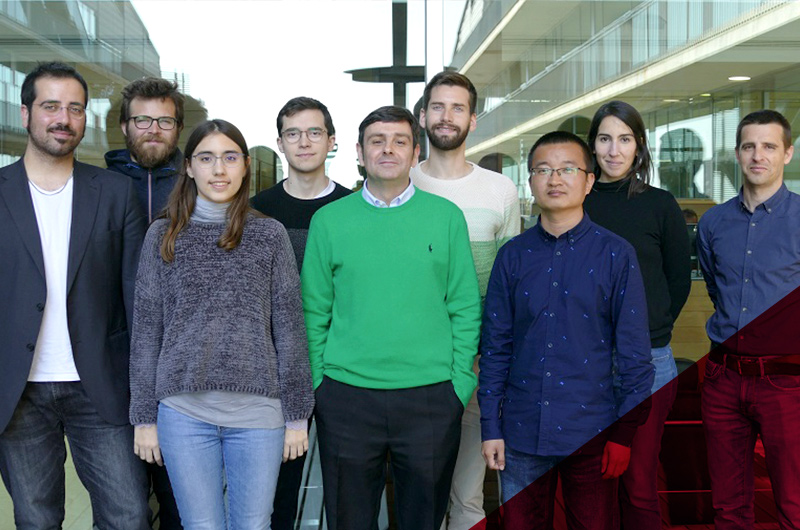Dynamical Systems Biology
Jordi Garcia Ojalvo

Group website
Research Outline
 The Dynamical Systems Biology laboratory studies the dynamics of living systems, from unicellular organisms to human beings. We use dynamical phenomena to identify the molecular mechanisms of biological processes such as cellular decision-making and spatial self-organization. Using a combination of theoretical modelling and experimental tools including time-lapse fluorescence microscopy and microfluidics, we investigate dynamical phenomena such as pulses and oscillations, and study how multiple instances of these processes coexist inside cells and tissues in a coordinated way. At a larger level of organization, we use conductance-based neural models to link the structural properties of brain networks with their function.
The Dynamical Systems Biology laboratory studies the dynamics of living systems, from unicellular organisms to human beings. We use dynamical phenomena to identify the molecular mechanisms of biological processes such as cellular decision-making and spatial self-organization. Using a combination of theoretical modelling and experimental tools including time-lapse fluorescence microscopy and microfluidics, we investigate dynamical phenomena such as pulses and oscillations, and study how multiple instances of these processes coexist inside cells and tissues in a coordinated way. At a larger level of organization, we use conductance-based neural models to link the structural properties of brain networks with their function.
Research Lines
- Cellular computation
We study how cells process external information, by analyzing how the architecture of their regulatory networks allow them to encode the recent history of the cell and predict future changes in their environment.
- Stress response in bacteria at the single-cell level
We investigate how bacterial cells self-organize in space and time when subject to different kinds of stresses, including nutrient starvation and antibiotics.
- Dynamics of cellular signaling
We analyze the temporal organization of signaling processes at the single-cell level in organisms ranging from yeast to mammalian cells. We also study the regulation of the immune response in the context of autoimmune diseases such as multiple sclerosis.
- Brain dynamics
We study the dynamics of the brain at different scales, from the microscopic scale of neuronal networks to the macroscopic scale of the full brain, in the context of a variety of pathologies including Down's syndrome and Alzheimer's disease.
Team during 2017-18
- Postdocs: Gang Zhou.
- PhD students: Lara Escuaín de Poole, Marçal Gabaldà Sagarra, Leticia Galera Laporta, Maciej Jedynak, David Ibañez Soria, Keith Kennedy, Daniel Malagarriga Guasch, Rosa Martinez Corral, Pablo Ruiz Ibarrechevea, Carlos Toscano Ochoa.
- Technicians: Miquel Sas.
Selected publications 2017-18
- Guisoni, N., Martinez-Corral, R., Garcia-Ojalvo, J., and Navascués, J. de (2017). Diversity of fate outcomes in cell pairs under lateral inhibition. Development 144, 1177–1186. http://dev.biologists.org/content/144/7/1177.
- Liu, J., Martinez-Corral, R., Prindle, A., Lee, D.D., Larkin, J., Gabalda-Sagarra, M., Garcia-Ojalvo, J., and Süel, G.M. (2017). Coupling between distant biofilms and emergence of nutrient time-sharing. Science 356, 638–642. http://science.sciencemag.org/content/356/6338/638.
- Martinez-Corral, R., Liu, J., Süel, G.M., and Garcia-Ojalvo, J. (2018). Bistable emergence of oscillations in growing Bacillus subtilis biofilms. PNAS 115, E8333–E8340. http://www.pnas.org/content/115/36/E8333.
- Martinez-Corral, R., Raimundez, E., Lin, Y., Elowitz, M.B., and Garcia-Ojalvo, J. (2018). Self-Amplifying Pulsatile Protein Dynamics without Positive Feedback. Cell Systems 7, 453-462.e1. https://linkinghub.elsevier.com/retrieve/pii/S2405471218303594.
- Park, J., Dies, M., Lin, Y., Hormoz, S., Smith-Unna, S.E., Quinodoz, S., Hernández-Jiménez, M.J., Garcia-Ojalvo, J., Locke, J.C.W., and Elowitz, M.B. (2018). Molecular Time Sharing through Dynamic Pulsing in Single Cells. Cell Systems 6, 216-229.e15. http://www.cell.com/cell-systems/abstract/S2405-4712(18)30011-5.
Other relevant information 2017-18
Organization of the 2017 EMBO Conference on Quantitative Principles in Biology, EMBL Heidelberg, November 2-4, 2017
Organization of the International Conference on Biological Aging from the Perspective of Physics, Information and Life Sciences, Jacobs University Bremen, July 16-20, 2018
Keynote addresses at DutchBiophysics 2018 (Veldhoven, October 1, 2018) and 6th International Iberian Biophysics Congress / X Iberoamerican Congress of Biophysics (Castellon, June 21, 2018)
Participation in the scientific committees of the 2018 and 2019 International Conference on Systems Biology

